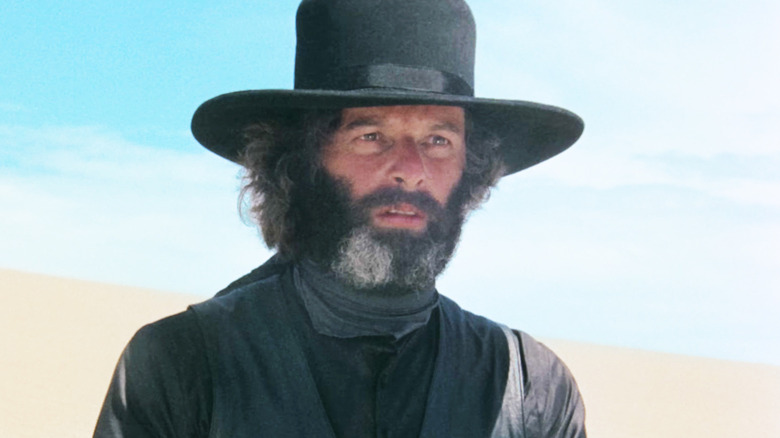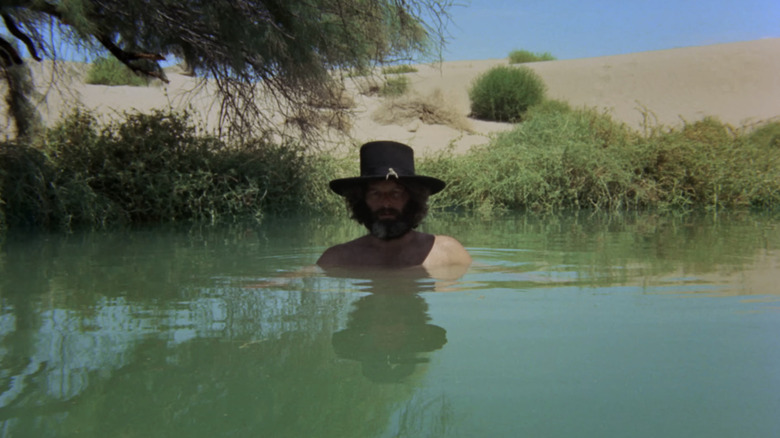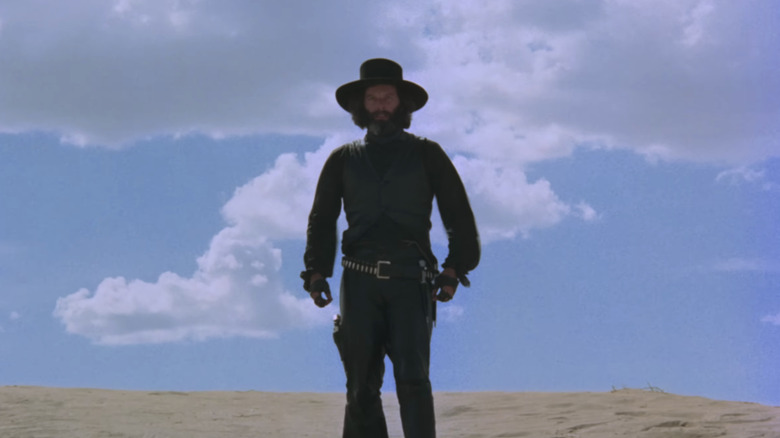Roger Ebert Gave A Perfect Score To This Controversial And Disturbing '70s Western
The Western died in the 1970s, but according to Roger Ebert, that had absolutely nothing to do with "El Topo." The 1970 surrealist Western was one of a handful of films to receive a perfect score from the esteemed critic, who evidently found it to be a masterpiece even while several of his fellow critics dismissed it as meaningless.
Widely known as the very first "midnight movie," "El Topo" was guaranteed cult status when it started screening at 12am at New York's Elgin Theater in December 1970. The film came from Alejandro Jodorowsky, a Chilean auteur who, two decades later, would make the surrealist "Santa Sangre," a horror movie just as beautiful as it is terrifying. Before he could do any of that, however, he had to make an impression in the U.S., which he more than did with "El Topo." The film, which Jodorowsky wrote, directed, scored, and even starred in, contained many of the surrealist elements of his later horror masterpiece, but it was all done within the framework of the still burgeoning revisionist Western (which he infused with a countercultural spiri)t.
The film follows the titular gunfighter and outlaw as he wanders the desert alongside his young son in search of enlightenment. Along the way, he encounters a woman who tells him of four fellow gunfighters who reside in the desert and who El Topo must defeat in order to gain her love. That's about as straightforward a précis as you're gonna get with this movie, which became known as the very first "acid Western" for good reason. As such, you might expect Ebert to have shunned it like many of his colleagues. But not only did he give Jodorowsky a fair appraisal, he absolutely loved what he saw.
Roger Ebert found a lot of depth in El Topo
"El Topo" — which was released as part of a 4K Jodorowsky box set in 2020 — upset a few critics upon its wide release. After six months of midnight showings, the movie suddenly premiered in Times Square, which meant several high-profile reviewers got a chance to provide their take on the film. As you might expect with a surrealist Western that embodied the spirit of the 1960s counter culture, many of those longstanding and respected critics simply couldn't get along with Alejandro Jodorowsky's movie. Gene Siskel dubbed it a "violent, would-be erotic freakshow," and while he admitted some might find it "very heavy," for others, he wrote, "it is enough to make one yawn." Siskel's pal Roger Ebert, however, was enthralled.
Ebert saw the film as working on two levels, both as a "greasy, grimy, gore-dripping Western" and as a "kind of freaked-out philosophical catchall" that "inspires people to invent or discover hidden meanings and secret levels." The critic saw a lot to like in Jodorowsky's concatenation of symbols, which he drew from multiple sources to create a kind of twisted tapestry and, as Ebert put it, used these symbols in "a shifting, prismatic way" to cast "light on each other instead of on the film's conclusion." As such, Ebert felt "El Topo" shared a lot in common with T.S. Eliot's poem, "The Waste Land," which similarly contrasted "fragments of mythology against the ruins of the post-Christian era."
The critic wasn't too concerned with the extreme violence, either, as much as that bothered other reviewers at the time. For Ebert, Jodorowsky managed to avoid exploitation filmmaking in part because, as he put it, the filmmaker "dazzles us with such delicate mythological footwork that the violence becomes distanced."
Roger Ebert's El Topo review was ahead of its time
Roger Ebert often surprised with his "perfect" reviews, like when he gave a full four stars to the Samuel L. Jackson crime-thriller "Lakeview Terrance." Perhaps even more shockingly, Ebert also thought Zack Snyder's "Watchmen" was a perfect movie. But the celebrated critic had been producing reviews that went against the general sentiment for decades, his take on "El Topo" being but one example. While he was far from the only critic to "get" Alejandro Jodorowsky's film, he did bestow four stars on the feature and seemed enamored by its countercultural surrealism ... even if he didn't seem entirely sure what it all meant.
For Ebert, the movie could either be seen as "a complex fantasy that uses violence as the most convenient cinematic shorthand for human power relationships" or as "the work of a cynic, who is simply supplying more jolts and shocks per minute than most filmmakers." Ultimately, he chose to view it as the former simply because, as he noted in his review, the director could easily have made "a much simpler, less ambitious movie" in order to deliver the kind of exploitation film that many critics accused "El Topo" of being. As Ebert noted, such a film would have had "the violence of 'El Topo' but not its uncanny resonance."
He was certainly ahead of his time with this one. In the years since its initially release, "El Topo" has been reappraised and is now regarded as an important work. It's also a cult classic with an 80% fresh rating on Rotten Tomatoes, so clearly Ebert's view of it as much more than an empty, uber violent exploitation film was a shrewd one.


